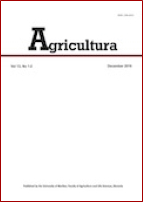Chinaberry Aqueous Extract and Fumigant Effects on Carob Moth
DOI:
https://doi.org/10.18690/agricultura.15.1-2.13-17.2018Keywords:
date palm, chinaberry,, aqueous extract, carob moth, fumigant toxicityAbstract
To fight against carob moth, Ectomyelois ceratoniae (Zeller, 1879) (Lepidoptera: Pyralidae), and minimise adverse effects of conventional pesticides use, an aqueous extraction by infusion of chinaberry tree leaves, Melia azedarach (Meliaceae), was carried out. Five concentrations of chinaberry leaf aqueous extract were applied in total randomization by spraying directly on eggs, larvae and adults of carob moth under laboratory conditions. Also, the fumigant effect of chinaberry leaf powder was tested on carob moth adults. Obtained results after statistical analyses showed that eggs hatching after four days were not affected by the aqueous extract with a rate of 55% of hatching eggs in both control and treated eggs. On larvae, more than 86% of mortality at 250 mg/ml was obtained. The lethal concentrations LC50 and LC90 were of 121.24 and 266.74 mg/ml, respectively. In the case of adults, application of aqueous extract had caused 93% of mortality at 250 mg/ ml after 24 hours with lethal concentrations CL50 and CL90 equal to 111.38 and 240.31 mg/ml, respectively. The fumigant effect of chinaberry powdered leaves did not affect this stage. Our study showed clearly that aqueous extract of chinaberry might offer additional solution in integrated pest management strategies.
